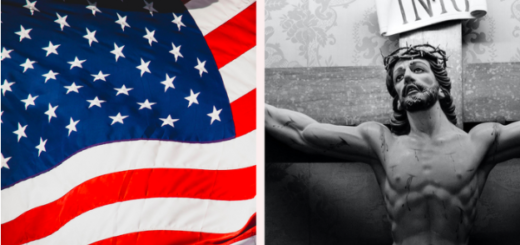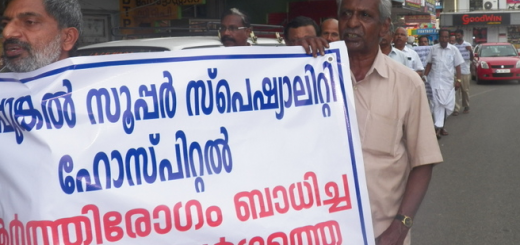The first papal visit to Iraq can promote inter-faith dialogue in an age of religious polarisation

Human Brotherhood first & Formost! Wed 3 Mar 2021, in the Guardian. Iraqis put up a poster announcing the upcoming visit of Pope Francis and a meeting with Grand Ayatollah Ali al-Sistani in Najaf, Iraq. Photograph: Anmar Khalil/AP
Pope Francis finally landed in Iraq for his 4-day visit to try to bring about ‘Human Fraternity’(Fratelli Tutti) the one goal of his pontificate. A visit to Iraq, a goal not defined then, was also planned by two precious Popes, not achieved.
Human Brotherhood First!
Yes human brotherhood alone, not religious or church unity, was the goal of Jesus, SON OF MAN,(his epitaph:INRI), ideal human for all times, places and peoples alone, not religious or Christian – all later developments, now ending in a “Field hospital” of dead, dying, wounded or bleeding! Without the First, no other unity is ever possible! So Francis is strictly in the footsteps of Jesus.
Clash of Civilizations on!
The first historic public proclamation of split, division and conflict was proclaimed as ‘clash of civilisations between Christianity and Islam’ by Huntington tracing its roots to Crusades, then to a multiplication of global religious divides – orgsanised or scattered — and present internecine fights from salvation in ‘Christ, no in Allah’ or in any ‘god’ of one’s figment!
Can Francis succeed in his second visit to a Muslim country after Cairo? That too when too many prelates and bishops fighting tooth and nail against him? Jesus fell thrice on his way to mountain top! Right or wrong, Francis should succeed, is my humble opinion! james kottoor rdotor ccv.
Please read below Guardian view on Iraq Visit!
The lead-up to the first-ever papal visit to Iraq has been somewhat overshadowed by concerns over its timing. Last month, a surge of coronavirus cases led the Iraqi government to impose a partial lockdown and curfew.
The Vatican’s ambassador to Iraq, Archbishop Mitja Leskovar, is currently self-isolating after testing positive for Covid, and there are fears that crowds enthusiastic to see Pope Francis could ignore social distancing rules at public events. Security concerns have also been heightened by the double suicide bombing at a Baghdad market in January, which killed at least 32 people.
The Iraqi authorities are confident that the risks can be managed. But given the circumstances, there was certainly a case for delaying the trip, which begins on Friday and will last four days.
The pope’s determination to go ahead testifies to the significance he attaches to a visit that sums up two key themes of his papacy: the need to develop genuine inter-faith dialogue with Islam, and a non-sectarian vision of the church as a “field hospital”, where the spiritual wounds of the suffering are healed.
On Saturday, in the city of Najaf, a holy city for Shia Muslims, Francis will meet the Grand Ayatollah Ali al-Sistani, Iraq’s leading Shia cleric and one of the world’s most influential Muslim leaders. He will also visit Christian communities in Baghdad and in Iraq’s north, where thousands of believers were killed by occupying Islamic State forces between 2014 and 2017.
Many more fled Iraq altogether. Since the disastrous Anglo-American invasion in 2003 unleashed a cycle of violence and sectarianism, the estimated Christian population of the country has plummeted from around 1.5 million to between 200,000 and 300,000.
A message of inter-faith tolerance and solidarity will be symbolised by a joint prayer service at the ancient archeological site of Ur, believed to be the birthplace of Abraham. The ceremony will be attended by Yazidis and other Iraqi religious minorities, as well as Muslims and Christians.
Following the 9/11 attacks and the Iraq war, the notion of a clash of civilisations between Christianity and Islam fuelled the growth of violent religious extremism, with tragic and bloody consequences. Christian minorities in the Middle East and elsewhere have suffered persecution.
In parts of Europe and in the United States, the promotion of “cultural Christianity” has become a proxy for thinly-veiled Islamophobia and hostility towards migrants. The pope’s visit to Iraq, which takes as its motto the words of Matthew’s gospel, “You are all brothers”, is intended to challenge such divisions and distortions of religious faith.
Two years ago, Pope Francis joined with the grand imam of Cairo’s al-Azhar mosque, Sheikh Ahmed al-Tayeb, one of the world’s leading Sunni clerics, in a groundbreaking call for a cross-faith commitment to human fraternity.
In an era of cultural and religious polarisation, alliances such as these are desperately needed to create a counter-narrative. Pope Francis’s trip, and his meeting with the grand ayatollah, will hopefully prove to be landmark moments in that crucial task.
In the pic: Iraqis put up a poster announcing the upcoming visit of Pope Francis and a meeting with Grand Ayatollah Ali al-Sistani in Najaf, Iraq. Photograph: Anmar Khalil/AP
62 The lead-up to the first-ever papal visit to Iraq has been somewhat overshadowed by concerns over its timing. Last month, a surge of coronavirus cases led the Iraqi government to impose a partial lockdown and curfew. The Vatican’s ambassador to Iraq, Archbishop Mitja Leskovar, is currently self-isolating after testing positive for Covid, and there are fears that crowds enthusiastic to see Pope Francis could ignore social distancing rules at public events. Security concerns have also been heightened by the double suicide bombing at a Baghdad market in January, which killed at least 32 people.
The Iraqi authorities are confident that the risks can be managed. But given the circumstances, there was certainly a case for delaying the trip, which begins on Friday and will last four days. The pope’s determination to go ahead testifies to the significance he attaches to a visit that sums up two key themes of his papacy: the need to develop genuine inter-faith dialogue with Islam, and a non-sectarian vision of the church as a “field hospital”, where the spiritual wounds of the suffering are healed.
Advertisement
On Saturday, in the city of Najaf, a holy city for Shia Muslims, Francis will meet the Grand Ayatollah Ali al-Sistani, Iraq’s leading Shia cleric and one of the world’s most influential Muslim leaders. He will also visit Christian communities in Baghdad and in Iraq’s north, where thousands of believers were killed by occupying Islamic State forces between 2014 and 2017. Many more fled Iraq altogether. Since the disastrous Anglo-American invasion in 2003 unleashed a cycle of violence and sectarianism, the estimated Christian population of the country has plummeted from around 1.5 million to between 200,000 and 300,000. A message of inter-faith tolerance and solidarity will be symbolised by a joint prayer service at the ancient archeological site of Ur, believed to be the birthplace of Abraham. The ceremony will be attended by Yazidis and other Iraqi religious minorities, as well as Muslims and Christians.
Following the 9/11 attacks and the Iraq war, the notion of a clash of civilisations between Christianity and Islam fuelled the growth of violent religious extremism, with tragic and bloody consequences. Christian minorities in the Middle East and elsewhere have suffered persecution. In parts of Europe and in the United States, the promotion of “cultural Christianity” has become a proxy for thinly-veiled Islamophobia and hostility towards migrants. The pope’s visit to Iraq, which takes as its motto the words of Matthew’s gospel, “You are all brothers”, is intended to challenge such divisions and distortions of religious faith. Two years ago, Pope Francis joined with the grand imam of Cairo’s al-Azhar mosque, Sheikh Ahmed al-Tayeb, one of the world’s leading Sunni clerics, in a groundbreaking call for a cross-faith commitment to human fraternity. In an era of cultural and religious polarisation, alliances such as these are desperately needed to create a counter-narrative. Pope Francis’s trip, and his meeting with the grand ayatollah, will hopefully prove to be landmark moments in that crucial task.

















Forget it. At least for the moment. Think about the unity of all those who call themselves Christians. There are thousands of divisions, all calling themselves Christians. All these divisions sprang up because of money and power. Nobody wants to sacrifice his position/hold on followers and, above all, the wealth which can be possessed and controlled. Some years ago one Bishop Aprem joined the Catholic Church/Syo-Malabar Rite and nobody cares to remember his fate he faced in his last years. Nobody will be ready to sacrifice his position and wealth. Some years ago there was news about the Anglican Church and the Church of Rome joining but nothing much happened. The Archbishop of Canterbury had said 'why we cannot obey the Pope'. The circumstances which lead to the creation/establishment of the Anglican Church five (500) years ago no more exist. The schism that arose and the coming into existence of the Eastern Church a thousand years ago is no more relevant in 2021. The people who are in the Chair controlling these divisions are not ready to sacrifice/losing their grip on the faithful and the vast resources available at their disposal.
For the present, let us think about the unity of all Christians. Let us think about the day when all the heads of these divisions ready to come together and discuss and select a single Head for the entire Christian faithful of the world.
Any idea of unity of faith is destined to be dead on arrival. It would have been possible to a large extent had not the Christians promoted Jesus to "Son God" and then invented "Trinity" to justify it. Other major irritants for the Muslims include the installing of human intermediaries (dead humans though) between god and humans, statues installed at place of worship and Catholic rituals like Eucharistic ceremony. I am of the opinion that before seeking unity with Islam, the Pope should try to unify many factions of Christianity in circulation these days.